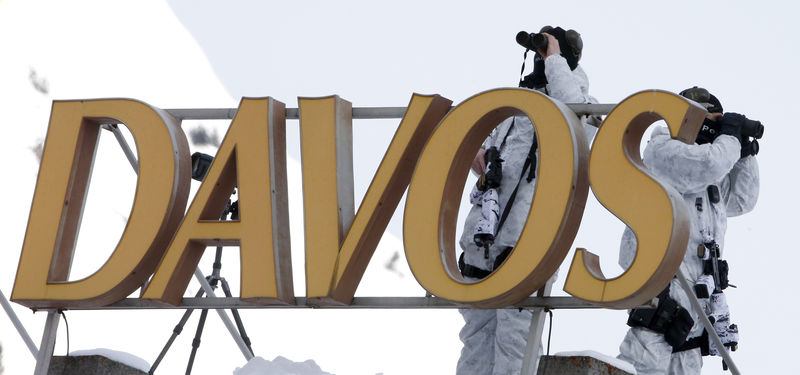By Dmitry Zhdannikov
DAVOS, Switzerland (Reuters) - OPEC defended on Wednesday its decision not to intervene to halt the oil price collapse, shrugging off warnings by top energy firms that the cartel's policy could lead to a huge supply shortage as investments dry up.
The strain the halving of oil prices since June is putting on producers was laid bare when member Oman voiced its first direct, public criticism of the Organization of the Petroleum Exporting Countries' November decision not to cut production but instead to focus on market share.
Oil prices have collapsed to below $50 a barrel as a result of a large supply glut, due mostly to a sharp rise in U.S. shale production as well as weaker global demand.
The rapid decline has left several smaller oil producing countries reeling and has forced oil companies to slash budgets.
Speaking at the World Economic Forum in Davos, Switzerland, the heads of two of the world's largest oil firms warned that the decline in investments in future production could lead to a supply shortage and a dramatic price increase.
Claudio Descalzi, the head of Italian energy company Eni Spa, said that unless OPEC acts to restore stability in oil prices, these could overshoot to $200 per barrel several years down the line.
"What we need is stability... OPEC is like the central bank for oil which must give stability to the oil prices to be able to invest in a regular way," Descalzi told Reuters Television.
He expected prices to stay low for 12-18 months but then start a gradual recovery as U.S. shale oil production began falling.
STICKING TO GUNS
But both OPEC and Saudi Arabia, the group's largest producer, stuck to their guns.
"If we had cut in November we would have to cut again and again as non-OPEC would be increasing production," OPEC Secretary General Abdullah al-Badri said in Davos.
"Everyone tells us to cut. But I want to ask you, do we produce at higher cost or lower costs? Let's produce the lower cost oil first and then produce the higher cost," Badri said.
"Prices will rebound. I saw this 3-4 times in my life."
Al-Badri said the policy was not directed at Russia, Iran or the United States.
State-run oil company Saudi Aramco Chief Executive Khalid al-Falih also appeared unfazed, saying that although it could take some time, the oil market will eventually balance itself.
The chief executive of French oil major Total Patrick Pouyanne echoed Descalzi's warnings.
"There is a natural decline of five percent a year from existing fields around the world. That means by 2030 more than half of the existing global oil production will disappear. There is an enormous amount of money that needs to be invested to get another 50 million barrels per day of new production," Pouyanne said in Davos.
Total is set to cut capital spending by 10 percent this year from 2014's $26 billion, reducing investments in the North Sea and U.S. shale production, he added.

Total joins a raft of international oil companies, including BP and ConocoPhillips, that have slashed 2015 budgets due to lower prices.